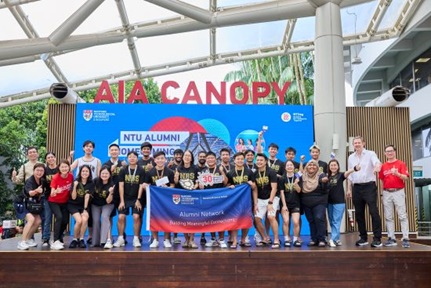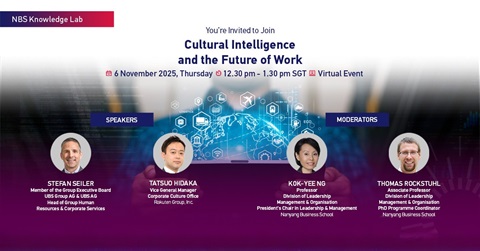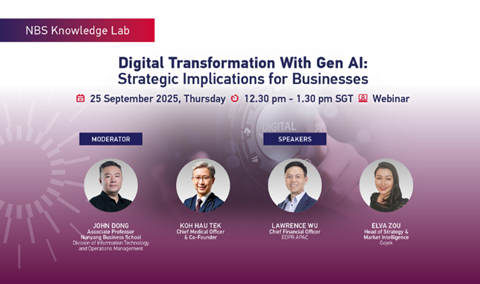Leading Corporate Sustainability and Decarbonisation: An NBS Alumni Continuous Learning Presentation and Dialogue in Bangkok
To arrest increasing global temperatures, there is an urgent need to achieve zero carbon emissions by 2050. The speakers shared how companies can address sustainability and decarbonisation challenges strategically to mitigate the effects of climate change.
The event was organised for international NBS Alumni members and was held in Bangkok on 17 November 2023. Professor Viswanathan, Director of Centre of Business Sustainability at NBS, delivered an informative presentation before joining NBS Alumni Advisory Board Member Ms Do Van Anh Thu Anlee, General Manager (Thailand, Vietnam, Philippines, and Mekong region) of Lufthansa Group for a dialogue session.
The following is an edited transcript:
Prof Viswanathan on implementing corporate sustainability efforts
In line with global commitments towards net zero, companies need to elevate sustainability as a key priority.
A good way for companies to start their sustainability initiatives is to pivot from their LEAN or LEAN-Six Sigma programmes (initiatives to maximise value while minimising waste) by adding carbon emissions reduction as an additional deliverable for projects under these programmes.
For a more comprehensive approach, companies may adopt Prof Viswanathan’s Sustainable Impact Reference Framework (SIRF), which is a framework for identifying and adopting sustainability practices across every aspect of a firm’s operations. Some of the key areas to focus as per this framework are:
- Incorporating sustainability into the product design stage
A good example is how Nike innovated its product designs using what they call the “considered design” approach to reduce environmental impact of their manufacturing and assembly operations. A Considered Design Index was developed for product designers to quickly evaluate and score the sustainability/environmental performance of a particular product based on its design. As an example to illustrate the features of this considered design index, higher points were given in the index for using mechanical bonding instead of chemical bonding, which creates polluting fumes that requires workers to wear PPE.
- Designing new processes to reduce emissions.
Companies in the hard-to-abate sectors have started to look at new processes such as electrification to replace fossil fuels to generate steam or heat. To kickstart further process innovation, companies can consider implementing internal carbon tax to motivate respective business units to design new carbon reduction processes.
- Prioritising sustainable procurement.
The amount of emissions from suppliers should not be ignored. For example, most of Apple’s emissions are generated upstream in the supply chain. Companies should actively seek to reduce their scope three emissions contributed by suppliers.
- Embracing circular economy principles.
Circular economy involves sharing, leasing, reusing, repairing, refurbishing, and recycling existing materials and products. Companies should seek to preserve and extend the life cycle of its products and reduce waste to a minimum.
- Investing in net-zero buildings
While there is an initial upfront cost, net-zero buildings will save overheads such as electricity over time. Companies can tap on sustainable financing to reduce the capital outlay of developing these buildings.
Ms. Anlee on Lufthansa's decarbonisation strategies
Decarbonisation is a huge challenge for the aviation sector, which accounts for about less than 3 percent of global carbon emissions. Lufthansa has committed to achieving carbon neutrality by 2050 through the following efforts:
Encouraging intermodality concept to avoid CO2 emission
Railway and public transportation are the greener way of travelling and Lufthansa is tying up with rail operators to allow customers to purchase a single ticket for their flight and rail connections. This concept of intermodality is now available in Lufthansa’s European hubs and in South Korea. Lufthansa Group views this as a long-term investment in sustainability towards business success.
Reducing emissions through operational efficiency
Fleet renewal is a way to reduce carbon emissions as a new aircraft consumes up to 30 percent less fuel compared to its older version. Another way to significantly reduce emissions is replacing conventional jet fuel with Sustainable Aviation Fuel (SAF) which is produced from waste cooking oil.
Fuel savings and emissions reductions have also been enabled through innovative technology such as AeroSHARK which is the adhesive bionic films that replicate the skin of sharks. The efficiency of this technology optimises the airflow around the aircraft, thereby enabling fuel savings and emissions reductions.
Reducing wastage
Customers will be able to indicate early if they wish to opt out of meals onboard so there is less wastage. There are also plans to allow Lufthansa’s customers to donate the cost of their onboard meals to sustainability projects.
Q & A Segment
Accountability of decarbonisation
Addressing a question on how countries are held accountable for their decarbonisation targets, Prof Viswanathan pointed out that while there is no hard enforcement of the Paris Agreement, there is urgency and peer pressure to decarbonise. As extreme weather conditions are expected to become more frequent and intense across the planet, countries and companies face moral pressure to decarbonise or risk being ostracised by their own citizens and the international community.
Carbon footprint of buying new aircraft
Responding to a question on the carbon footprint of buying new aircraft, Ms Anlee explained that it is important that Lufthansa Group keeps investing in fleet renewal as the newer aircraft versions can significantly reduce CO2 emissions compared to the older or retrofitted versions.
Corporate sustainability is the key to long-term business success and should be a priority. To pursue net-zero targets and other sustainability deliverables, companies need to innovate and adapt practices across key functional areas.
Watch the masterclass here:

.tmb-listing.png?Culture=en&sfvrsn=d48abb4_1)




